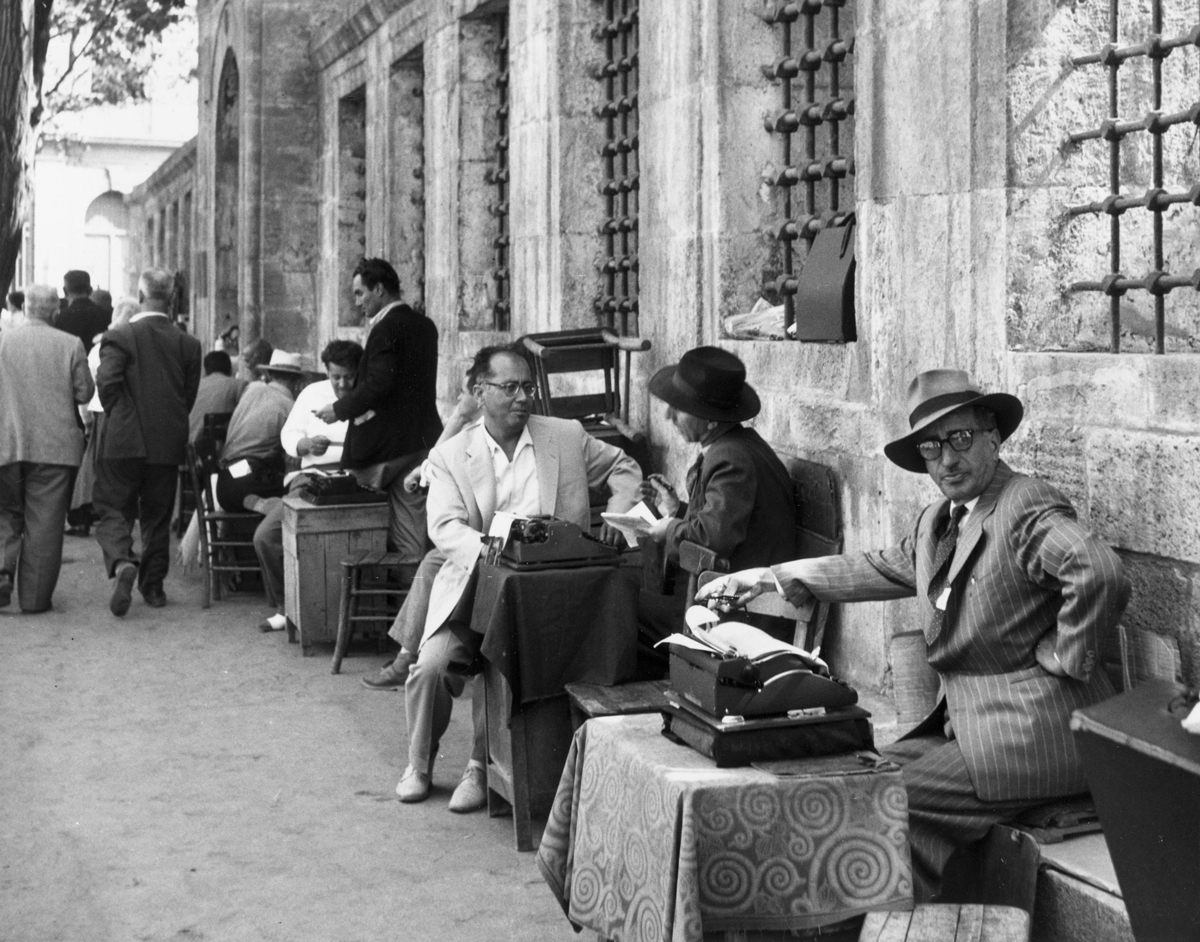Istanbul Closes the Books on Its Public Scribes
The street-based document writers for hire have been a fixture since the days of the Ottoman Empire.

On a side street near Istanbul’s Çağlayan Courthouse, an electric sign reading “Petition Writer” points to the open door of 67-year-old Hayrettin Talih’s tiny, one-room office. A casual passerby might think it a typical Turkish workplace, unadorned except for the obligatory photograph of Turkey’s first president, Mustafa Kemal Atatürk, and a framed verse of the Quran.
While those pillars of Turkish society never change, it appears that little else changes in the office either: Talih sits in front of a manual typewriter, in the same pose as a black-and-white photograph of himself, from 40 years earlier, which is tacked on the wall beside him.
Occupying the chairs opposite his desk are a couple of older citizens who are explaining a property dispute with a relative. Talih listens, demands clarification where necessary, and finally applies his fingers to the chattering typewriter, producing an affídavit that the couple will use to start proceedings at the courthouse, and hopefully get their rightful dues.

Although he is not a lawyer, Talih has clients who clearly trust him to translate their experiences into Turkish legalese, which is replete with archaic Ottoman words—much like the Latin phrases beloved of English-speaking lawyers. An understanding of this obscure language is vital to Talih’s work as a public scribe or arzuhalci, a profession he entered almost 50 years ago. Now, he is one of the last of his kind.
When asked why he has kept using his old typewriter, Talih replies that computers are merely another way of writing, not a source of reliable information. “There’s a form used in the courthouse,” he says. “Do you know what it says on it? ‘Do not put all your trust in the information you read on the computer.’” Talih cautions against referring to legal advice found on the internet. “The computer can only give the form, but people don’t know what to write. That’s the basis of our job: what do you want and how are you going to say it?” he says.

Public scribes were a necessity in the Ottoman era, when the language used in state documents was even farther removed from ordinary speech and a large percentage of the population was illiterate. On top of legal work, the scribes also made a living by writing love notes and letters for soldiers who travelled to fight in the wars that consumed the Ottoman Empire in the late 19th and early 20th centuries. One of the earliest accounts of the profession is from 17th-century traveller Evliya Çelebi, who wrote that there were around 500 scribes in Istanbul at the time. An imperial decree of 1764 noted that the scribes had been a regulated guild since the early years of the empire, with their own licenses and entrance exams. Iconic author Yaşar Kemal spent some years working as a scribe and wrote several novels that include scribes as characters.
When asked how many of his colleagues remain in Istanbul, Talih says, “They’re so few that I could count them on my fingers.”
Meanwhile, scribe Adnan Gültek sits with his typewriter outside the Social Security Center in the old city’s Unkapanı neighborhood. The image of the scribe consulting with clients on the street has inspired paintings by Fausto Zonaro and Osman Hamdi Bey, as well as photographs by Marc Riboud and Ara Güler. These artworks depict the scribe as an archetypal part of Istanbul’s street culture, which is now set to vanish.

“It won’t be long before people stop coming to us. Some of our work has already gone to the internet, and once the rest goes there’ll be nothing left to do,” Gültek says, in reference to an online system that allows citizens to file court cases via the internet, unveiled by the Department of Justice in 2015.
While Talih spent 40 years outside the old Sultanahmet courthouse with his typewriter, things changed when the Çağlayan courthouse opened in 2012. “A big group of us worked on the street for one month,” he says. “There was a complaint made against us and so the municipality took all our typewriters. They said that working on the street was absolutely forbidden there, and if they saw us they’d take our equipment again. So I was forced to find this shop.”

Gültek would prefer to work in an office but says he cannot afford the rent. “I’m tired of working on the street. It isn’t easy talking and listening with all this noise,” he says. “If it rains we’re here with our umbrellas, and in the mud and the snow. If stones fall from the sky we’ll still be here.”
Turkish bar associations have created difficulties for the remaining scribes. In 2012, an Istanbul court sentenced eight scribes to one year in prison and a fine of 7,300 lira ($1780) for composing legal documents for clients, an activity that the court considered to be “using authorities that belong to a lawyer.” A similar case in Niğde this year ended in acquittal, suggesting that there is some inconsistency in the application of the law.
Meanwhile, the scribes say that they do not claim to be lawyers, as they merely help clients to express themselves on paper. “Let’s say I wrote something I don’t know about, and the person lost all his expenses and lost the case. Won’t he turn around and complain about me for putting him in that loss? It’s better not to write something you don’t know,” Talih says.

Both scribes defend their profession as the only option for those who cannot afford a lawyer. “Never mind the work that we do here, just consulting a lawyer costs 250 or 300 lira [$73]. We give the information they need, we write what needs to be written, and we take 15 lira [$4],” says Gültek.
But according to İmmihan Sadioğlu, a lawyer at the Istanbul Bar Association, the scribes’ work is not as harmless as it might appear. “Their legal knowledge is made up of hearsay or things that they’ve heard without receiving a school education. The laws change every day and there’s a very complicated set of procedures,” she says. According to Sadioğlu, the legal labyrinth cannot be navigated by an amateur, and the specific wording that the scribes use in the initial documents can be crucial. “The documents that arzuhalcis write are very important, and they open the way to a loss of time and rights that can’t be regained afterwards,” she says.

After all, there is a government system in Turkey that covers the costs of those who cannot afford to pay a lawyer. The bar association’s concern is that the scribes, while offering an inferior service, take advantage of people who are not aware of this system. As this government support becomes better known, Sadioğlu and her fellow lawyers believe that the last scribes will see the writing on the wall.
“If a disadvantaged person can access justice easily, then he won’t look for other solutions. As for the state, it should increase the level of funding for legal aid,” Sadioğlu says. “Someone who can receive a better and higher quality service from a free lawyer will not consider risking his rights by using a scribe.”








Follow us on Twitter to get the latest on the world's hidden wonders.
Like us on Facebook to get the latest on the world's hidden wonders.
Follow us on Twitter Like us on Facebook